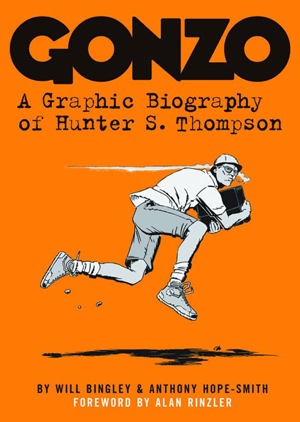 After I read Gonzo: the Life of Hunter S. Thompson a few years ago I figured I knew everything I wanted to know about the famous journalist. But then I received a review copy of Gonzo: A Graphic Biography of Hunter S. Thompson by Will Bingley (author) and Anthony Hope-Smith (illustrator). I was attracted to its bright orange cover and the drawing of the long-legged Thompson clutching a satchel, running away from something. It was enough to entice me to crack open the book. I didn't stop reading until I was finished, past my bedtime, a couple of hours later.
After I read Gonzo: the Life of Hunter S. Thompson a few years ago I figured I knew everything I wanted to know about the famous journalist. But then I received a review copy of Gonzo: A Graphic Biography of Hunter S. Thompson by Will Bingley (author) and Anthony Hope-Smith (illustrator). I was attracted to its bright orange cover and the drawing of the long-legged Thompson clutching a satchel, running away from something. It was enough to entice me to crack open the book. I didn't stop reading until I was finished, past my bedtime, a couple of hours later.
 180 pages isn't much room to examine a life in minute detail. Instead, Bingley tells a story (as if it were written, quite convincingly, by Thompson himself) of Thompson's frantic search to find meaning in the turbulent era he lived in. Bingley's story is about a passionate, rebellious genius who sprinted too fast at the beginning of a long-distance race, collapsed early, and spent his remaining decades burnt-out, crawling bewilderedly.
180 pages isn't much room to examine a life in minute detail. Instead, Bingley tells a story (as if it were written, quite convincingly, by Thompson himself) of Thompson's frantic search to find meaning in the turbulent era he lived in. Bingley's story is about a passionate, rebellious genius who sprinted too fast at the beginning of a long-distance race, collapsed early, and spent his remaining decades burnt-out, crawling bewilderedly.
The book's forward, written by Thompson's longtime editor, Alan Rinzler, is especially revealing. Rinzler believes that Thompson could have been the "heavyweight champion of American letters," but his self-destructive behavior, which got worse with each passing year, ruined that opportunity.
I was interested to read how Thompson and Rinzler worked together:
In order to make the deadline for Fear and Loathing on the Campaign Trail, for example, we set up an old Nagra reel-to-reel tape recorder in his room at the Seal Rock Inn, and I'd pepper him with questions, which he'd answer profusely. Then we'd have it transcribed, edit me out, and polish up the remaining text for the book itself. It took three days and nights but turned out pretty well in my opinion. After that we did Amerika, The Great Shark Hunt, and The Curse of Lono using better hardware, smaller machines, ending up in 1981 with a tiny hand-held table-top micro-recorder.
After Lono, says Rinzler, "Hunter's substance abuse, writer's block and brief attention span were increasing exponentially. He's slip out to see his dealer and come back so tanked he couldn't think straight." Thompson's work became a series of "repetitious, mediocre, regurgitated articles and books and collections he allowed to be issued and reissued over the last 30 years of his life."
The Curse of Lono was the last book by Thompson I read, but I don't doubt Rinzler's assessment of the quality of Thompson's books that followed. (Thompson's awful "Hey Rube!" columns for an ESPN website were enough to keep me uninterested in his newer books). But his earlier work, especially Hell's Angels, is so good that I will always admire Thompson as a heavyweight contender who showed a very promising start. Bingley and Hope-Smith's book reinforces that opinion.
Buy Gonzo: A Graphic Biography of Hunter S. Thompson on Amazon





